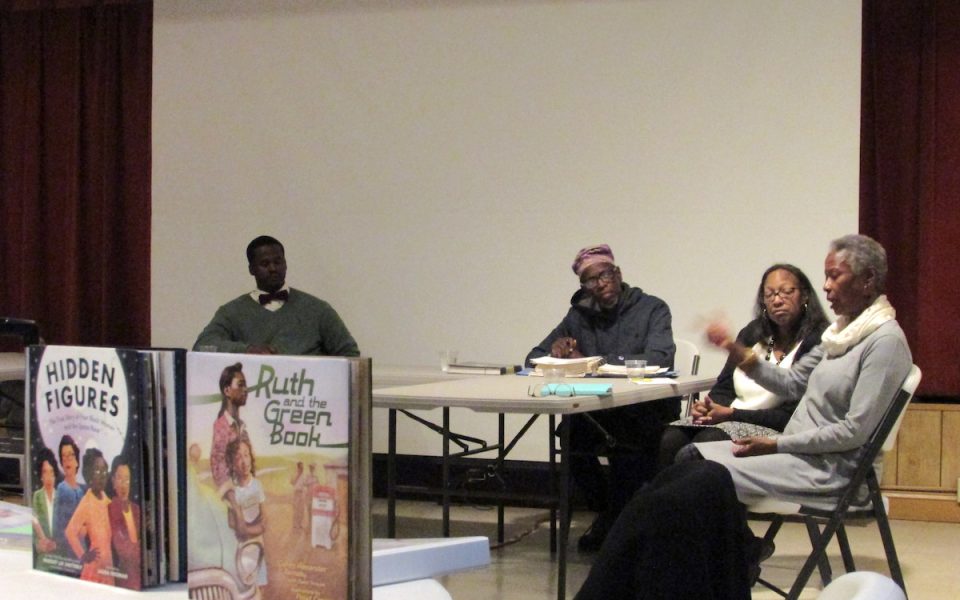The vote by the
Winston-Salem/Forsyth County School Board to reject a mandatory black studies
class in October presents advocates for
African-American studies with a dilemma.
After two
years of lobbying, a coalition led by Hate Out of Winston and the Local
Organizing Committee saw all but one member of the school board vote against
the mandatory black studies class on Oct. 22. Instead, the board backed a
proposal by Superintendent Angela Hairston to enhance something called the
“K-12 Cultural Infusion Project.” Leaders of the Winston-Salem NAACP and
Action4Equity Coalition spoke in favor of the superintendent’s plan. In the
fallout, the two factions of black-led education advocacy have erupted in
mutual recrimination on Facebook.
While
leaders of Hate Out of Winston have insisted they’ll keep fighting for a
mandatory black studies class, Action4Equity and the Young Adult Committee of
the Winston-Salem NAACP hosted a forum at First Baptist Church on Highland
Avenue on Nov. 21 to talk about how to mobilize the community to strengthen
African-American studies through the infusion program.
Community leaders had the opportunity to direct questions at Rebecca
McKnight, who shepherds the infusion program as the K-12 social studies
director for the school district, and Willette Nash, who launched the program
27 years ago.
“One thing that I think is important is to separate — just for a second — the infusion from the mandatory course, because there is absolutely no reason why those two things should not live together in harmony,” McKnight said.
“I strongly believe that it is too late to have a course in high school and to really not have conversations with all children, not just African-American, before they get to their sophomore or their junior year, and then everybody has to take this course about African-American history. That is too late if we are trying to improve how people view others and how people view themselves.”
McKnight was echoing a concern previously voiced by school board Chair
Malishai Woodbury that without exposure to African-American studies throughout
elementary and middle school, requiring a black studies course for graduation
would be setting up black students in particular for failure.
But considering that the infusion project has been in place since 1993, why don’t the students already have the foundation they need for a mandatory high school-level course?
In essence, the gap lies in the fact that teachers aren’t required to
incorporate African-American history into their lesson plans, as the infusion
program asks them to do.
“African-American history is American history,” McKnight said. “And so,
what we say to teachers is: ‘If you’re talking about the Civil War, rather than
use this primary source, use this one that has an African-American
perspective. You’re talking about the same event. The Civil War happened, but
the perspective on it is different depending on who it happened to.’ Teachers
have tried to say, ‘This is too much.’ It’s not too much. You’re going to have
to make some choices. We want you to choose these African-American sources
sometimes rather than these more — I hate to use the word ‘traditional’ — but
you know, more Euro-centric documents to teach the same thing.”
Nash said teachers need to be held accountable for implementation of
the infusion program.
“Teachers are going to have to be evaluated,” she said, “and it will have to now be a condition for continued employment.”
While the school board turned down the request for mandatory black
studies, Superintendent Hairston’s proposal to enhance the infusion project
includes a provision to ensure that African American Studies, Latin American
Studies and American Indian Studies are offered at all traditional high
schools.
Currently, students at predominantly white high schools are the biggest
beneficiaries of the black studies program.
One teacher who attended the forum recalled an instance a couple years
ago when there weren’t enough students at Carver High School — the school with
the highest black population — for the administration to justify offering
African-American Studies. Asked which schools are currently offering African
American Studies, McKnight mentioned Reagan High School, West Forsyth High
School and North Forsyth High School. Reagan and West Forsyth each have black
student populations of less than 12 percent.
McKnight reiterated Hairston’s pledge that going forward every
traditional high school in the district will offer African American Studies,
Latin American Studies and American Indian Studies.
“To do that, we need to make sure the kids know that the classes are
possible, and that it’s not about whether enough kids sign up,” McKnight said.
“Dr. Hairston has also said that if eight kids sign up for a class at a school
— in the past, traditionally, that means the class won’t be on the schedule.
She has said that if we get eight students sign up for the class, then we as a
school system and as a school building need to figure out how to make that
happen.”
When asked how long it will take Winston-Salem/Forsyth County Schools
to implement a mandatory black studies class, she cited the example of
Philadelphia.
“I don’t think it’s going to be a two-year process,” she said. “When I
think about Philadelphia, it took a 40-year process for them to get the
mandatory African-American history course to be put in place. Now, do I think
40 years? We don’t have time for that.”
Join the First Amendment Society, a membership that goes directly to funding TCB‘s newsroom.
We believe that reporting can save the world.
The TCB First Amendment Society recognizes the vital role of a free, unfettered press with a bundling of local experiences designed to build community, and unique engagements with our newsroom that will help you understand, and shape, local journalism’s critical role in uplifting the people in our cities.
All revenue goes directly into the newsroom as reporters’ salaries and freelance commissions.


Leave a Reply